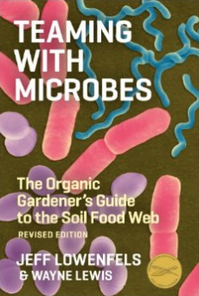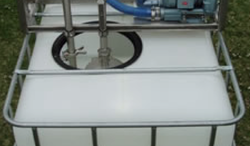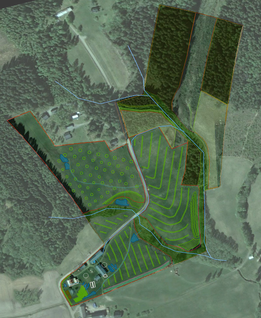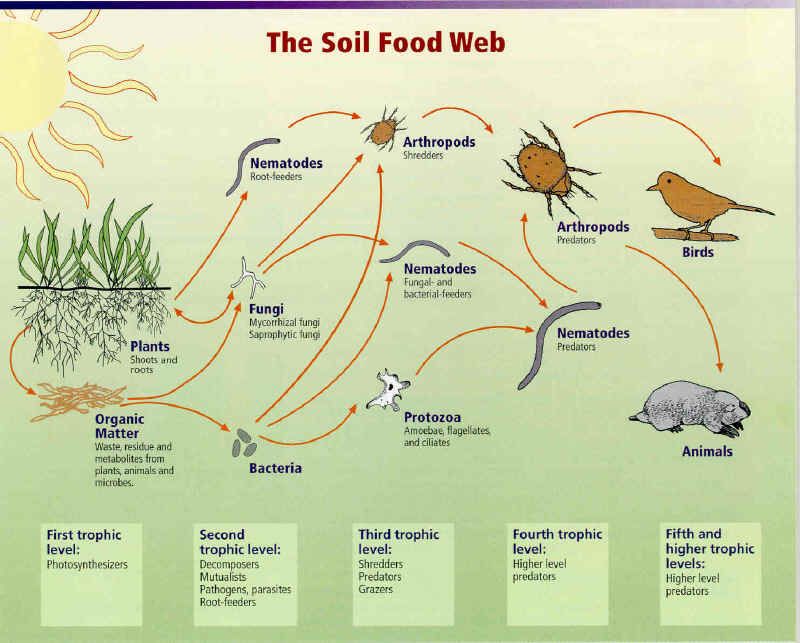 Want to be in to win a free copy of this AWESOME book? As part of our fair share policy we have been giving away free awesome books to people all over the globe every fortnight (well, to be fair, we have been a little slack lately with all that's going on and our current internet connection). The 2011 Garden Writers of America Gold Award for Best Writing/Book proves soil is anything but an inert substance. Healthy soil is teeming with life; and not just earthworms and insects, but a staggering multitude of bacteria, fungi, and other microorganisms. When we use chemical fertilizers, we injure the microbial life that sustains healthy plants, and thus become increasingly dependent on an arsenal of artificial substances, many of them toxic to humans as well as other forms of life. But there is an alternative to this vicious circle: to garden in a way that strengthens, rather than destroys, the soil food web; the complex world of soil-dwelling organisms whose interactions create a nurturing environment for plants.  Besides making good aerobic compost & other good soil building practices, one way we work with micro- organisms is compost teas. We are making both bacterial (for our veg. gardens) & fungal optimized teas for our tree crop establishment at Ridgedale; we have been cleaning out old IBC containers as we need quite some volume! We apply this to help restore the vital microbiology to our degraded farm surrounded by monocultural Spruce forest. We use an old Sewage pump that can pump at 5000l/m, although on a garden scale you can get a good result with a bucket and a fish- tank bubbler. We combine regular compost teas foliar sprays with BioFertilisers (inspired by the work of MasHumus), which gives us a way to make broad spectrum fertiliser replacement with natural materials either lying around or easy to source. In this way put both back both the nutrient & the life that make the nutrients available to plants. We feed SOIL, as opposed to plants (they know how to feed themselves when given the chance!) Have a look below to find out more about the key soil organisms that do all the work for us. You can also read an old blog post here about soil micro- organisms & thoughts about selecting a microscope so you can monitor your own compost/ compost teas. BACTERIA Bacteria are tiny, one-celled organisms – generally 4/100,000 of an inch wide (1 µm) and somewhat longer in length. What bacteria lack in size, they make up in numbers. A teaspoon of productive soil generally contains between 100 million and 1 billion bacteria. That is as much mass as two cows per acre. FUNGI Fungi are microscopic cells that usually grow as long threads called hyphae, which push their way between soil particles, roots, and rocks. Hyphae are usually only several thousandths of an inch (a few micrometers) in diameter. A single hyphae can span in length from a few cells to many yards. A few fungi, such as yeast, are single cells. Hyphae sometimes group into masses called mycelium or thick, cord-like “rhizomorphs” that look like roots. Fungal fruiting structures (mushrooms) are made of hyphal strands, spores, and some special structures like gills on which spores form. A single individual fungus can include many fruiting bodies scattered across an area as large as a baseball diamond. Fungi perform important services related to water dynamics, nutrient cycling, and disease suppression. Along with bacteria, fungi are important as decomposers in the soil food web. They convert hard-to- digest organic material into forms that other organisms can use. Fungal hyphae physically bind soil particles together, creating stable aggregates that help increase water infiltration and soil water holding capacity. PROTOZOA Protozoa are single-celled animals that feed primarily on bacteria, but also eat other protozoa, soluble organic matter, and sometimes fungi. They are several times larger than bacteria – ranging from 1/5000 to 1/50 of an inch (5 to 500 µm) in diameter. As they eat bacteria, protozoa release excess nitrogen that can then be used by plants and other members of the food web. NEMATODES Nematodes are non-segmented worms typically 1/500 of an inch (50 µm) in diameter and 1/20 of an inch (1 mm) in length. Those few species responsible for plant diseases have received a lot of attention, but far less is known about the majority of the nematode community that plays beneficial roles in soil. An incredible variety of nematodes function at several trophic levels of the soil food web. Some feed on the plants and algae (first trophic level); others are grazers that feed on bacteria and fungi (second trophic level); and some feed on other nematodes (higher trophic levels). MITES "Many bugs, known as arthropods, make their home in the soil. They get their name from their jointed (arthros) legs (podos). Arthropods are invertebrates, that is, they have no backbone, and rely instead on an external covering called an exoskeleton. Arthropods range in size from microscopic to several inches in length. They include insects, such as springtails, beetles, and ants; crustaceans such as sowbugs; arachnids such as spiders and mites; myriapods, such as centipedes and millipedes; and scorpions. Nearly every soil is home to many different arthropod species. Certain row-crop soils contain several dozen species of arthropods in a square mile. Several thousand different species may live in a square mile of forest soil." WORMS They are major decomposers of dead and decomposing organic matter, and derive their nutrition from the bacteria and fungi that grow upon these materials. They fragment organic matter and make major contributions to recycling the nutrients it contains. Earthworms occur in most temperate soils and many tropical soils. They are divided into 23 families, more than 700 genera, and more than 7,000 species. They range from an inch to two yards in length and are found seasonally at all depths in the soil. In terms of biomass and overall activity, earthworms dominate the world of soil invertebrates, including arthropods. Want to come and learn with us about how to regenerate soils and a WHOLE bunch more? Our Keyline patterned landscape Our Keyline patterned landscape We're gearing up for a unique & exciting Permaculture training happening in Europe this year, in fact it's so exciting we're running 2; April- July 2014 http://www.ridgedalepermaculture.com/10-week-internship-apr--jul-2014.html July- Sept 2014 http://www.ridgedalepermaculture.com/10-week-internship-jul---sept-2014.html Read all about it at the links above and join an awesome team from all over the globe as we regenerate this old farm into a thriving & diverse local integrated food hub in beautiful Sweden. We also run 3x 90hr+ Permaculture Design Certificates every year form the farm, which you can also find out about on the Courses tabs above. Come and get involved!
10 Comments
10/4/2014 05:43:23 am
Hello!
Reply
Jaya
10/4/2014 10:57:34 am
id love to dive into soilidary foodweb interconnections,
Reply
Josh
10/4/2014 08:07:25 pm
Looks like a very interesting book
Reply
Ulla Fåhraeus
11/4/2014 04:24:53 am
Microbiology is great! Would love to have this book!
Reply
john
11/4/2014 03:21:01 pm
Microbiology is fun! This book seems to be summing up lots of my previous various sources.Having been interested in composting for years this would really complement my learning and further my attempts of creating a resilient life. Cheers!
Reply
Silvia Peroni
13/4/2014 04:57:48 am
Must be awsome to learn more about soil food web!!
Reply
Karl Persson
13/4/2014 05:03:30 am
Hey jag skulle oxå jättegärna läsa den här boken( m kan ta med den så spar ni portot) ;)
Reply
Dawn Driskill
13/4/2014 10:01:06 am
You are preaching to the choir and the book sounds really good!
Reply
Ridgedale Richard
25/4/2014 01:45:23 am
Hi Dawn, We selected you out the hat for the Free Awesome book giveaway. Apologies to everyone who shared & commented that we drew the winner so late; we are building our farm to receive our interns over the weekend and have shoddy internet currently. Hope you enjoy the updates over this busy season, keep posted for the next awesome Free Book Giveaway and plenty more interesting articles, resources, etc...
Reply
Leave a Reply. |
Details
Like us on FB Below for regular updatesStay up to date with customized updates you want to receive
Upcoming coursesArchives
December 2016
Categories
All
|


 RSS Feed
RSS Feed